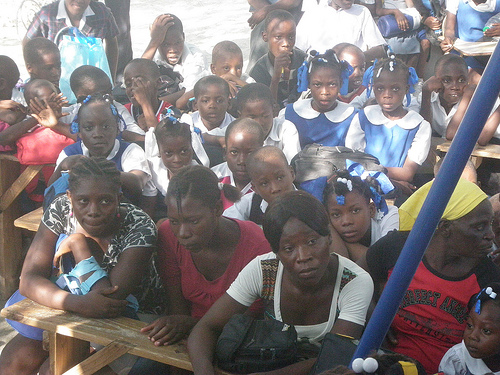
Parents and children gather at a cholera seminar in Haiti. Photo courtesy of European Disaster Volunteers.
By Ralph De La Cruz
Florida Center for Investigative Reporting
“Globalization has made us more vulnerable. It creates a world without borders, and makes us painfully aware of the limitations of our present instruments, and of politics, to meet its challenges.”
— Former Swedish Foreign Minister Anna Lindh
Anyone who still doubts the veracity of that statement hasn’t been keeping up with what’s been happening in Haiti lately.
Haiti – a country which had never had a recorded case of cholera – has been dealing with an outbreak of cholera this fall. The cholera is now rumored to have been brought into the country by UN peacekeeping troops from Nepal, which had a cholera outbreak of its own in the summer.
The peacekeepers are there because Haiti has been struggling with political corruption and hooliganism for most of the second half of the 20th century. It’s been a festering wound that has perpetuated poverty and led to a multitude of secondary and tertiary problems, such as emigration, environmental degradation and disease.
As I reported in earlier, at the end of October the Haitian government believed that the Cholera outbreak was under control.
But then Tropical Storm Tomas hit and canals overflowed, overwhelming the few modern sewage systems. Now the epidemic appears to have arrived.
Glad I wasn’t born there, is the easy answer for many Americans too absorbed by Bristol Palin dancing with the stars.
But any such bubble of self-delusion burst at Miami International Airport on Thanksgiving night.
A man developed cholera symptoms during a plane flight from the Dominican Republic. Luckily the symptoms began on the plane, and the victim was a doctor who was able to self-diagnose. And even if cholera had landed in South Florida, no big deal. The man will no doubt go on antibiotics and get plenty of clean water. Everything will be fine.
But I challenge you to read that article without wondering how many people may have already entered South Florida who simply did not share their condition with any officials. Or had symptoms that started after they arrived. Or didn’t show any symptons. Three-quarters of people who have the disease don’t display symptoms, yet can be infectious for two weeks.
It’s hard to read about that incident and not be reminded that sometimes we focus so much on the satellites and computers that we forget our world is linked just as much with blood and bacteria.
And Florida is one of the main arteries into the United States.
Meanwhile, facing a possible epidemic, Haiti held elections Sunday.
And what forward-looking person wouldn’t want to scream, “Hooray?”
I mean, the ballot box is where change takes place, right? Where healing starts. Where a strong government, mindful of the tremendous challenges and its responsibilities, harnesses the country’s resolve and international aid, and attacks the problem. Commits to upgrade the infrastructure, build sanitation and water plants.
Or so I fantasized.
But as Signor Ferrari informed Victor Laszlo in Casablanca, “Might as well be frank, monsieur.” It would take a miracle to get a positive outcome from a Haitian election, and miracles have practically been outlawed in Haiti. Indeed, the election has been chaotic and violent.
After spending more than a quarter century working on Haiti’s infectious problems, Paul Farmer, a Harvard medical professor and founder of the charitable group, Partners in Health, probably understands Haiti’s issues as well as anyone.
This is what Farmer said on C-SPAN: “Whether you’re talking about old problems, or new ones, they’re all rooted in poverty.”
And as the incident at Miami International Airport reminded us, we can’t stop trying. We just have to help smarter. And with more integrity ourselves.
A year ago, after the devastating Earthquake in Haiti, Farmer wrote a primer for using foreign aid in Haiti titled 5 Lessons From Haiti’s Disaster:
- Aid money needs to create jobs.
- Get funds to local governments.
- Housing, education and health care must be developed.
- Get efficient — cut operational and administrative costs, collect promised donations.
- Relief is the easy part.
“Disaster relief is not reconstruction,” Farmer wrote. “We haven’t rebuilt Haiti despite giving 1.1 million people access to drinking water; we didn’t remake the country with the 11,000 latrines that have been installed. ‘Building Haiti back better’ means sustaining those temporary gains and adding education, health care, services, and good governance.”
Never thought I’d read, “education, health care and services,” in a sentence and think, “That’s the easy part.”
